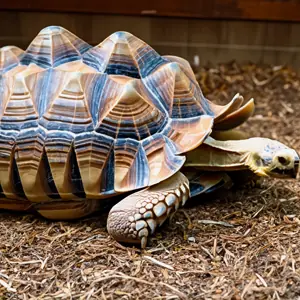
Browsing through your local pet store might make you think tortoises are a cool and inexpensive pet to own. After all, who wouldn’t want to take care of their own mini-dinosaur? But, there is a lot more to owning a tortoise than the sticker price. These animals can live for decades and sometimes have very particular needs. If you’re considering a tortoise as the next member of your family, you should be asking, “How much is a tortoise?” This guide will break down those costs in detail so you can understand the commitment you are making.
Jump Ahead
Getting a Tortoise
The first step in owning a tortoise is acquiring one. The cost of getting a tortoise can range from $50 to $200 for common types like Russian and Greek Tortoises. However, larger or rarer species like the Sulcata Tortoise can cost between $200 and $1,000 or even more. You should also know that exotic tortoise breeds often need costly permits. That means that the answer to How much is a tortoise changes depending on which tortoise you want.
For a more concrete example, Russian tortoises cost around $100 from your local pet store.
Creating a Home

The answer to How much is a tortoise doesn’t end at the pet store. Tortoises aren’t like dogs or cats, they need a specific environment to thrive. That means building a habitat is as important as picking out the right tortoise. It also means you are going to have to shell out some more money. Building an indoor enclosure can run you between $100 and $500, while an outdoor one can cost upwards of $200 to $1,000. Those cheaper small enclosures won’t leave your tortoise happy and healthy.
Setting Up an Indoor Enclosure:
An indoor enclosure provides a controlled environment for your tortoise and usually costs less compared to an outdoor setup. Below are some potential costs to consider:
- Enclosure: An appropriate indoor enclosure can cost anywhere from $100 to $800, depending on its construction. It’s important to note that tortoises need space to forage and explore. A very small habitat can be detrimental to herptile health.
- Heating and Lighting: Tortoises need UVB light to digest food. They also need, a heat source to regulate their temperature. Without these components, a tortoise will suffer. However, these tools don’t come cheap and, can cost between $20 and $100, when factoring in heat lamps, UVB lights, and thermostats.
- Substrate and Bedding: Providing the right bedding might range from $10 to $30, depending on the type and quantity required.
- Accessories: Food and water dishes, basking spots, and hiding areas, are important for creating a comfortable space and can cost around $20 to $50 in total.
- Plants and Decorations: Every animal needs enrichment to thrive. Tortoises are no different. Plants can provide natural decoration and cover that keeps your pet happy. Depending on your choices, common plants may cost between $20 and $50.
Developing an Outdoor Enclosure:
Creating an outdoor space allows your tortoise to experience natural sunlight and a larger living area. Unfortunately, it also can raise costs in an unexpected manner. Here we’ll break down some of the costs:
- Fencing: Your outdoor tortoise enclosure is going to need solid fences to keep your pet in and predators out. These can range anywhere from $50 to $300. It also may add complexity to your setup because many tortoises can burrow. A shallow fence may not be appropriate.
- Shelter: Providing shelter like a small shed or a covered area can cost between $50 and $200, providing protection from weather elements.
- Plants and Landscaping: Once again, your tortoise needs enrichment within its enclosure. Various plants and landscaping elements are key but can cost between $50 and $300.
- Heating and Lighting: You might think your tortoise doesn’t need heating and lighting outdoors. However, it is important to consider the weather and your tortoise’s health needs. Not all climates will give a tortoise an adequate environment. Additional equipment can cost anywhere from $20 to $200.
Understanding the costs involved in setting up both indoor and outdoor enclosures helps prospective tortoise owners plan their budgets and provide the best possible living environment for their tortoise friend.
Keeping the Right Environment
Tortoises need the right temperature and lighting. This is a critical aspect to consider when understanding how much a tortoise is to own. Heat lamps and bulbs can cost between $10 and $50 each, and UVB lights can range from $20 to $50 or more. Thermostats, which help regulate the temperature, may cost between $20 and $100.
For example, a basic heat lamp and UVB light setup can be set up for approximately $30. If you opt for more advanced and adjustable thermostat systems, the cost can reach up to $80.
Choosing the Right Bedding
Selecting suitable bedding is vital for your tortoise’s comfort and hygiene. Different bedding options can range from $10 to $50 per bag.
A bag of organic topsoil, an excellent and affordable bedding option, typically costs around $10. On the other hand, specialty substrates designed to mimic a tortoise’s natural habitat may be pricier, averaging around $30 per bag.
Proper Nutrition

As for long-term costs, the answer to How much is a tortoise might be rephrased as how much does a tortoise eat? Some tortoises have special dietary requirements. All are going to require fresh produce. Feeding your tortoise a balanced diet is important for its health. Budgeting around $20 to $50 per month for food is a good estimate but some may cost much more.
For instance, a monthly supply of fresh greens, vegetables, and a portion of commercial tortoise pellets can amount to approximately $30. If you include occasional treats like fruits or calcium supplements, the cost may reach $50.
Taking Care of Health
When owning a pet, a veterinarian can be your best friend. While dog and cats specialists can be found everywhere, reptile vets may be a little more complicated. They also may represent different costs. Make sure to research reptile vets in your area. A first visit to a vet normally costs around $100. Treatments, vaccinations, and dealing with any health issues may increase these costs.
An initial vet visit for a check-up and basic vaccinations might cost around $100. If your tortoise requires treatment for a specific health issue, the cost can vary greatly depending on the diagnosis and required treatments, often ranging from $100 to $300 or more.
Additional Needs
Many tortoises need vitamins and minerals to stay healthy. These supplements can cost around $10 to $30 per month. Accessories like food and water dishes, hiding spots, and basking platforms can range from $10 to $50 or more.
For example, a set of essential accessories including food and water dishes, a hiding spot, and a basking platform might cost around $20. If you opt for more intricate or multiple accessories, the cost can rise to approximately $50.
Being Prepared for Surprises
Life with a tortoise is an adventure, and like any adventure, unexpected twists can occur. It’s wise to set aside savings for unforeseen circumstances. Allocating approximately $200 to $500 each year for emergencies or unexpected repairs is a prudent approach.
Examples of Surprises and Their Potential Costs:
- Health Emergencies:
- Example: If your tortoise falls ill or gets injured unexpectedly, a vet visit and necessary treatments could cost between $200 and $500, depending on the severity of the condition.
- Equipment Malfunctions:
- Example: Your heat lamp or thermostat stops working suddenly. Replacing such equipment might range from $50 to $150.
- Structural Repairs:
- Example: Your tortoise’s enclosure sustains damage due to severe weather or wear and tear. Repairing or reinforcing the enclosure could cost $300 to $800.
- Unplanned Dietary Needs:
- Example: Your tortoise develops a specific dietary need due to a health condition. This means you need to make a change in its diet. All of a sudden you might be paying an additional $20 to $50 per month.
- Legal or Permittance Issues:
- Example: If you face legal issues due to ownership restrictions in your area or need to renew permits, legal fees and associated costs could range from $100 to $300 or more.
Having an emergency fund can provide peace of mind and ensure that you’re prepared to handle the unexpected, ensuring the well-being and happiness of your tortoise companion even during challenging times.
Conclusion: Anticipating the Financial Journey of Tortoise Ownership
Owning a tortoise is an incredible journey filled with joy, responsibility, and financial planning. Asking how much is a tortoise is an important first-step for prospective owners. For those aspiring to become tortoise parents, understanding the financial commitment is paramount. Let’s take the journey through tortoise ownership, focusing on a popular choice: the Russian Tortoise, to shed light on the costs involved.
Lifetime Costs for a Russian Tortoise:
- Acquisition: Acquiring a Russian Tortoise can cost approximately $100.
- Housing:
- Indoor Enclosure: Setting up a comfortable indoor habitat can range from $100 to $300.
- Outdoor Enclosure: Creating an enriching outdoor space may cost between $150 and $500.
- Temperature and Lighting: Budgeting for heating and lighting essentials amounts to around $50.
- Bedding: Choosing suitable bedding may total to approximately $30.
- Diet and Nutrition: Ensuring a balanced diet might cost $30 per month, adding up to $21,600 over an 80-year lifespan.
- Healthcare: Routine check-ups and treatments could sum up to approximately $2,000 over the tortoise’s lifetime.
- Supplements and Accessories: Additional supplies and accessories may cost around $40 annually, totaling $3,200.
- Emergency Fund: Setting aside an emergency fund of $350 per year adds up to $28,000 over the tortoise’s lifetime.
Total Lifetime Cost for a Russian Tortoise:
- Acquisition: $100
- Housing: $250 to $800
- Temperature and Lighting: $50
- Bedding: $30
- Diet and Nutrition: $21,600
- Healthcare: $2,000
- Supplements and Accessories: $3,200
- Emergency Fund: $28,000
Total Cost: Approximately $55,180 to $101,780
The lifetime cost of owning a Russian Tortoise demonstrates the significant financial commitment involved. Responsible planning, thoughtful budgeting, and proactive care ensure a rewarding and enriching experience for both the tortoise and its owner throughout their fascinating journey together.
